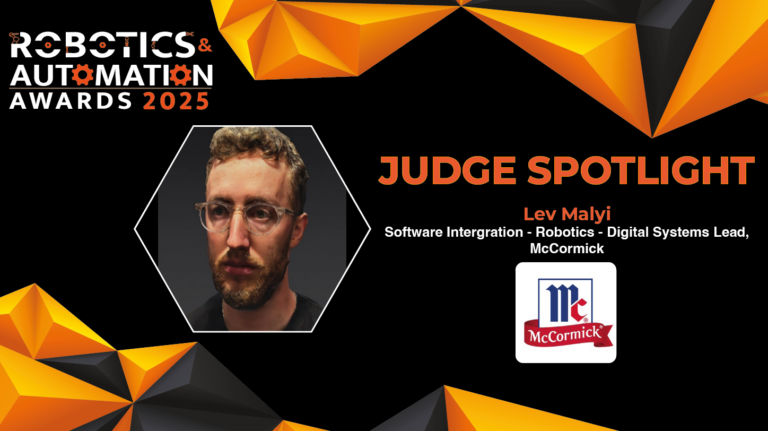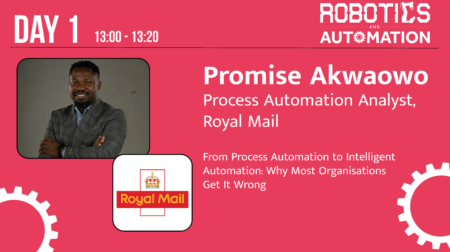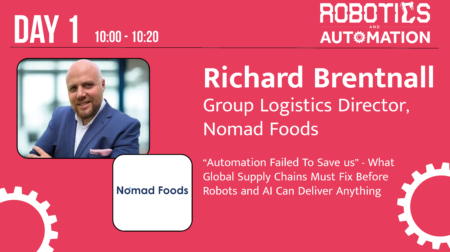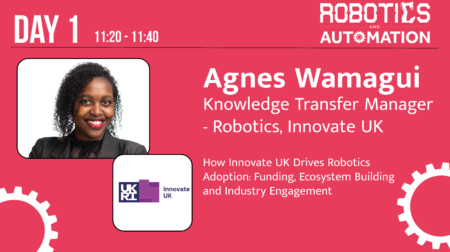With entries for the Robotics & Automation Awards 2025 now open, Robotics & Automation Magazine has launched an exclusive series of Q&A interviews with the expert panel of judges responsible for evaluating this year’s submissions.
Over the coming weeks and months, the magazine will spotlight each judge – a dynamic mix of thought leaders, technical specialists, and business strategists drawn from across the robotics, automation, AI and smart manufacturing sectors – to explore their backgrounds, industry outlooks and what they’ll be looking for in an award-winning entry.
From end users and integrators to researchers and investors, this year’s panel represents a diverse blend of practical and academic expertise – all of which will help identify the most transformative, scalable, and commercially viable innovations driving the next era of automation and intelligent systems.
Our next judge is Lev Malyi who is a digital systems lead with more than a decade of experience in software integration, industrial digitalisation projects, production control engineering, and robotics.
With his background in designing and implementing PLC-based control systems and his in-depth understanding of industrial IT and OT solutions, he plays a key role in building a bridge between hardcore industrial automation, the modern software world, and business processes to deliver cutting-edge software and hardware solutions.
As a judge for the Robotics & Automation Awards, Lev offers extensive knowledge in the industrial automation sector and manufacturing technologies.
Name: Lev Malyi
Job title: Software Integration, Robotics, and Digital Systems Lead
Organisation: McCormick
How does your professional background align with the Robotics & Automation Awards’ goal of recognising excellence in automation and intelligent technologies?
With over a decade of hands-on experience in automation and industrial robotics, I have built my career around developing, integrating, and leading advanced control systems across sectors. From working with low-level control systems to implementing a variety of robotic cells, my work has always focused on delivering robust automation solutions that deliver more than just a basic function. Excellence in automation today can’t be achieved without intelligent systems. At McCormick, I lead the digital transformation of manufacturing through the integration of MES, SCADA, ERP, and real-time analytics, combining operational technology with smart data-driven decision-making. My approach consistently merges traditional automation with intelligent software layers, including version control, disaster recovery frameworks, and cross-platform communication, to create adaptive and efficient environments. This aligns closely with the values of the Robotics & Automation Awards, where innovation in intelligent technologies is at the core of recognising industry impact.
What current trends or technologies in robotics and automation are you most excited about, and how do you anticipate seeing them reflected in this year’s entries?
While AI tends to dominate the conversation, what excites me more is the growing influence of modern software development practices in automation. For years, the industrial world has lagged behind in adopting scalable, modular, and version-controlled software approaches. That’s starting to change. We’re finally seeing proper software engineering principles like CI/CD, robust testing, and structured data management being applied to automation systems. This shift is long overdue, and it’s enabling smarter, more maintainable, and more reliable solutions on the factory floor.
Another trend I’m particularly interested in is the use of production data for real-time, meaningful decision-making. It’s not just about collecting data anymore—it’s about how you present it and what you do with it. The tools for data visualisation and analytics have matured significantly, and I see a lot of potential in how these tools are now being integrated into operations. Dashboards, predictive maintenance tools, and cross-platform data environments are moving from nice-to-have to business-critical. I expect many of this year’s entries will reflect that, showcasing not just automation for its own sake, but systems that are genuinely intelligent because they empower people to act on timely, well-structured insights.
From your perspective as a judge, what qualities will distinguish a truly standout submission?
From my perspective, the submissions that will truly stand out are those that show a deep understanding of the real-world constraints of industrial environments. Solutions that are built with legacy systems in mind, those that can be dropped into existing factories without requiring a total infrastructure overhaul, will always have the edge. In my experience, the best technologies are not just innovative, but also pragmatic. They respect the complexity of brownfield environments and find innovative, scalable ways to improve them without disrupting what already works.
Equally important is how a system supports the people who actually operate it. Far too often, automation is built solely for the sake of technical achievement, with little regard for the operators and engineers who interact with it on a daily basis. I’ll be looking for entries that place operational staff at the centre of their design—solutions that enhance visibility, simplify workflows, and make troubleshooting easier. If a system empowers the people on the floor, it’s far more likely to succeed and scale in a meaningful way.
How do industry awards such as these help foster innovation, investment and commercialisation in the robotics and automation sector?
In the automation space, it can be difficult for small or emerging companies to get visibility, especially when competing against well-established players. Industry awards like these help level the playing field. They give startups and independent teams a chance to showcase what they’re building, and more importantly, they help the right people hear about it. Recognition through a respected platform can open doors to partnerships, funding, and real-world trials that otherwise wouldn’t happen.
On the other side, these Awards also serve as a kind of radar for engineers and decision-makers. They give a snapshot of what’s actually being developed and where the industry is heading. It’s one thing to read white papers or marketing materials, but seeing which technologies are being recognised—and why—gives a far clearer signal of what’s gaining traction in practice. For anyone working on the factory floor or in the planning office, it’s a way to stay grounded in what matters and to see how others are solving similar problems.
Can you share an example of a robotics or automation innovation – either recent or historic – that you believe has had a lasting impact on the way industries operate?
With my background rooted in automotive automation, the innovation I believe has had the most lasting impact is the Toyota Production System and the adoption of Lean principles. While not a single technological breakthrough, Lean fundamentally changed how industries approach efficiency, quality, and process improvement. It shifted automation from being purely output-driven to being purpose-driven, focused on flow, adaptability, and continuous refinement. Even today, the best automation systems I encounter are grounded in Lean thinking, using data to reduce waste, empower operators, and make smarter, real-time decisions on the factory floor.
What advice would you give to companies and individuals submitting an entry this year?
My advice is to treat this not just as a chance to present your best work, but as an opportunity to get meaningful feedback from people who work across different parts of the industry. Don’t just show what you’ve achieved—be open about the challenges, trade-offs, and lessons learned. That openness often leads to the most valuable insights. Continuous improvement doesn’t happen in isolation, and this kind of platform is a rare chance to sharpen your thinking and push your ideas further.
Achievements and innovations in retail and e-commerce, healthcare and pharmaceuticals, food and beverage, automotive, transport & logistics, and more will be celebrated at the Robotics & Automation Awards on 29 October 2025 at De Vere Grand Connaught Rooms in London. Visit www.roboticsandautomationawards.co.uk to learn more about this unmissable event for the UK’s robotics and automation sectors!









